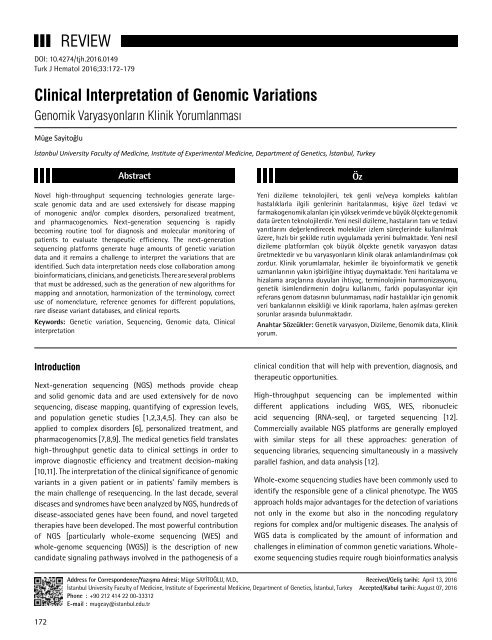Turkish Journal of Hematology Volume: 33 - Issue: 3
You also want an ePaper? Increase the reach of your titles
YUMPU automatically turns print PDFs into web optimized ePapers that Google loves.
REVIEW<br />
DOI: 10.4274/tjh.2016.0149<br />
Turk J Hematol 2016;<strong>33</strong>:172-179<br />
Clinical Interpretation <strong>of</strong> Genomic Variations<br />
Genomik Varyasyonların Klinik Yorumlanması<br />
Müge Sayitoğlu<br />
İstanbul University Faculty <strong>of</strong> Medicine, Institute <strong>of</strong> Experimental Medicine, Department <strong>of</strong> Genetics, İstanbul, Turkey<br />
Abstract<br />
Novel high-throughput sequencing technologies generate largescale<br />
genomic data and are used extensively for disease mapping<br />
<strong>of</strong> monogenic and/or complex disorders, personalized treatment,<br />
and pharmacogenomics. Next-generation sequencing is rapidly<br />
becoming routine tool for diagnosis and molecular monitoring <strong>of</strong><br />
patients to evaluate therapeutic efficiency. The next-generation<br />
sequencing platforms generate huge amounts <strong>of</strong> genetic variation<br />
data and it remains a challenge to interpret the variations that are<br />
identified. Such data interpretation needs close collaboration among<br />
bioinformaticians, clinicians, and geneticists. There are several problems<br />
that must be addressed, such as the generation <strong>of</strong> new algorithms for<br />
mapping and annotation, harmonization <strong>of</strong> the terminology, correct<br />
use <strong>of</strong> nomenclature, reference genomes for different populations,<br />
rare disease variant databases, and clinical reports.<br />
Keywords: Genetic variation, Sequencing, Genomic data, Clinical<br />
interpretation<br />
Öz<br />
Yeni dizileme teknolojileri, tek genli ve/veya kompleks kalıtılan<br />
hastalıklarla ilgili genlerinin haritalanması, kişiye özel tedavi ve<br />
farmakogenomik alanları için yüksek verimde ve büyük ölçekte genomik<br />
data üreten teknolojilerdir. Yeni nesil dizileme, hastaların tanı ve tedavi<br />
yanıtlarını değerlendirecek moleküler izlem süreçlerinde kullanılmak<br />
üzere, hızlı bir şekilde rutin uygulamada yerini bulmaktadır. Yeni nesil<br />
dizileme platformları çok büyük ölçekte genetik varyasyon datası<br />
üretmektedir ve bu varyasyonların klinik olarak anlamlandırılması çok<br />
zordur. Klinik yorumlamalar, hekimler ile biyoinformatik ve genetik<br />
uzmanlarının yakın işbirliğine ihtiyaç duymaktadır. Yeni haritalama ve<br />
hizalama araçlarına duyulan ihtiyaç, terminolojinin harmonizasyonu,<br />
genetik isimlendirmenin doğru kullanımı, farklı populasyonlar için<br />
referans genom datasının bulunmaması, nadir hastalıklar için genomik<br />
veri bankalarının eksikliği ve klinik raporlama, halen aşılması gereken<br />
sorunlar arasında bulunmaktadır.<br />
Anahtar Sözcükler: Genetik varyasyon, Dizileme, Genomik data, Klinik<br />
yorum.<br />
Introduction<br />
Next-generation sequencing (NGS) methods provide cheap<br />
and solid genomic data and are used extensively for de novo<br />
sequencing, disease mapping, quantifying <strong>of</strong> expression levels,<br />
and population genetic studies [1,2,3,4,5]. They can also be<br />
applied to complex disorders [6], personalized treatment, and<br />
pharmacogenomics [7,8,9]. The medical genetics field translates<br />
high-throughput genetic data to clinical settings in order to<br />
improve diagnostic efficiency and treatment decision-making<br />
[10,11]. The interpretation <strong>of</strong> the clinical significance <strong>of</strong> genomic<br />
variants in a given patient or in patients’ family members is<br />
the main challenge <strong>of</strong> resequencing. In the last decade, several<br />
diseases and syndromes have been analyzed by NGS, hundreds <strong>of</strong><br />
disease-associated genes have been found, and novel targeted<br />
therapies have been developed. The most powerful contribution<br />
<strong>of</strong> NGS [particularly whole-exome sequencing (WES) and<br />
whole-genome sequencing (WGS)] is the description <strong>of</strong> new<br />
candidate signaling pathways involved in the pathogenesis <strong>of</strong> a<br />
clinical condition that will help with prevention, diagnosis, and<br />
therapeutic opportunities.<br />
High-throughput sequencing can be implemented within<br />
different applications including WGS, WES, ribonucleic<br />
acid sequencing (RNA-seq), or targeted sequencing [12].<br />
Commercially available NGS platforms are generally employed<br />
with similar steps for all these approaches: generation <strong>of</strong><br />
sequencing libraries, sequencing simultaneously in a massively<br />
parallel fashion, and data analysis [12].<br />
Whole-exome sequencing studies have been commonly used to<br />
identify the responsible gene <strong>of</strong> a clinical phenotype. The WGS<br />
approach holds major advantages for the detection <strong>of</strong> variations<br />
not only in the exome but also in the noncoding regulatory<br />
regions for complex and/or multigenic diseases. The analysis <strong>of</strong><br />
WGS data is complicated by the amount <strong>of</strong> information and<br />
challenges in elimination <strong>of</strong> common genetic variations. Wholeexome<br />
sequencing studies require rough bioinformatics analysis<br />
Address for Correspondence/Yazışma Adresi: Müge SAYİTOĞLU, M.D.,<br />
İstanbul University Faculty <strong>of</strong> Medicine, Institute <strong>of</strong> Experimental Medicine, Department <strong>of</strong> Genetics, İstanbul, Turkey<br />
Phone : +90 212 414 22 00-<strong>33</strong>312<br />
E-mail : mugeay@istanbul.edu.tr<br />
Received/Geliş tarihi: April 13, 2016<br />
Accepted/Kabul tarihi: August 07, 2016<br />
172

















